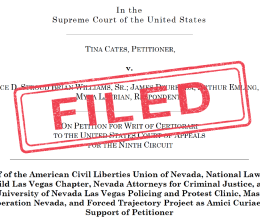This week the U.S. Supreme Court is scheduled to consider taking up the case of Cates v. Stroud. The case illustrates the failures of qualified immunity incredibly well, and the ACLU of Nevada and colleague organizations filed a friend of the court brief urging the Supreme Court to grant the case a hearing.
In Feb. 2017, Tina Cates went to visit her boyfriend at High Desert State Prison. According to court documents, the couple had been friends for nearly 20 years, and she had been visiting him once a week for several months.
That time however, the Las Vegas woman was approached by investigators with the Nevada Department of Corrections and told to follow them without explanation. She was taken into a restroom and told to strip naked. She was told to take out her tampon. She was told to bend over and spread her cheeks.
She complied because she didn’t know she could refuse.
Strip searches are humiliatingly intrusive and dehumanizing. Nevada Department of Corrections’ policies recognize this: Before conducting a strip search of any visitors, they are to tell the visitor they have the option to refuse to be searched. Every NDOC employee who conducts searches is required to know this policy.
The Fourth Amendment also prohibits warrantless searches without consent. The Ninth Circuit ruled that Cates’ Fourth Amendment rights had been violated. But here’s the rub: The court ruled the Department of Corrections staff named in the lawsuit could not be held accountable — even though they violated NDOC policies and Cates’ rights — because of qualified immunity.
SCOTUS has not taken any action on the petition for an appeal, but Nevada needs the court to review qualified immunity.
The actions of the Nevada Department of Corrections that this case brought to light are certainly shocking. Investigators violated a woman’s constitutional rights with a dehumanizing strip search, never presented a warrant, didn’t find any contraband, and banned her from future visits anyway.
But there is also a deeper question that Nevada needs addressed. If there’s no state-level mechanisms for addressing civil rights abuses, and the federal courts won’t do it because of qualified immunity, how does our community protect their constitutional rights?
There aren’t any adequate avenues in our state law to pursue claims of civil rights violations, yet Nevada statutes grant many, many protections to police and corrections officers — even more protections than people facing the loss of their liberty because they’ve been charged with a crime. And these are government actors for whom civil rights violations can mean dehumanization or even death.
Qualified immunity was originally intended only for good faith actors, but the standards have drifted over time and pushed accountability even further out of reach. Here we have NDOC staff violating the agency’s own regulations and a court ruling that violated a woman’s constitutional rights — but still the officers are shielded under qualified immunity.
The qualified immunity doctrine is broken, and something needs to be done about it. Nevadans deserve processes for accountability that work.

